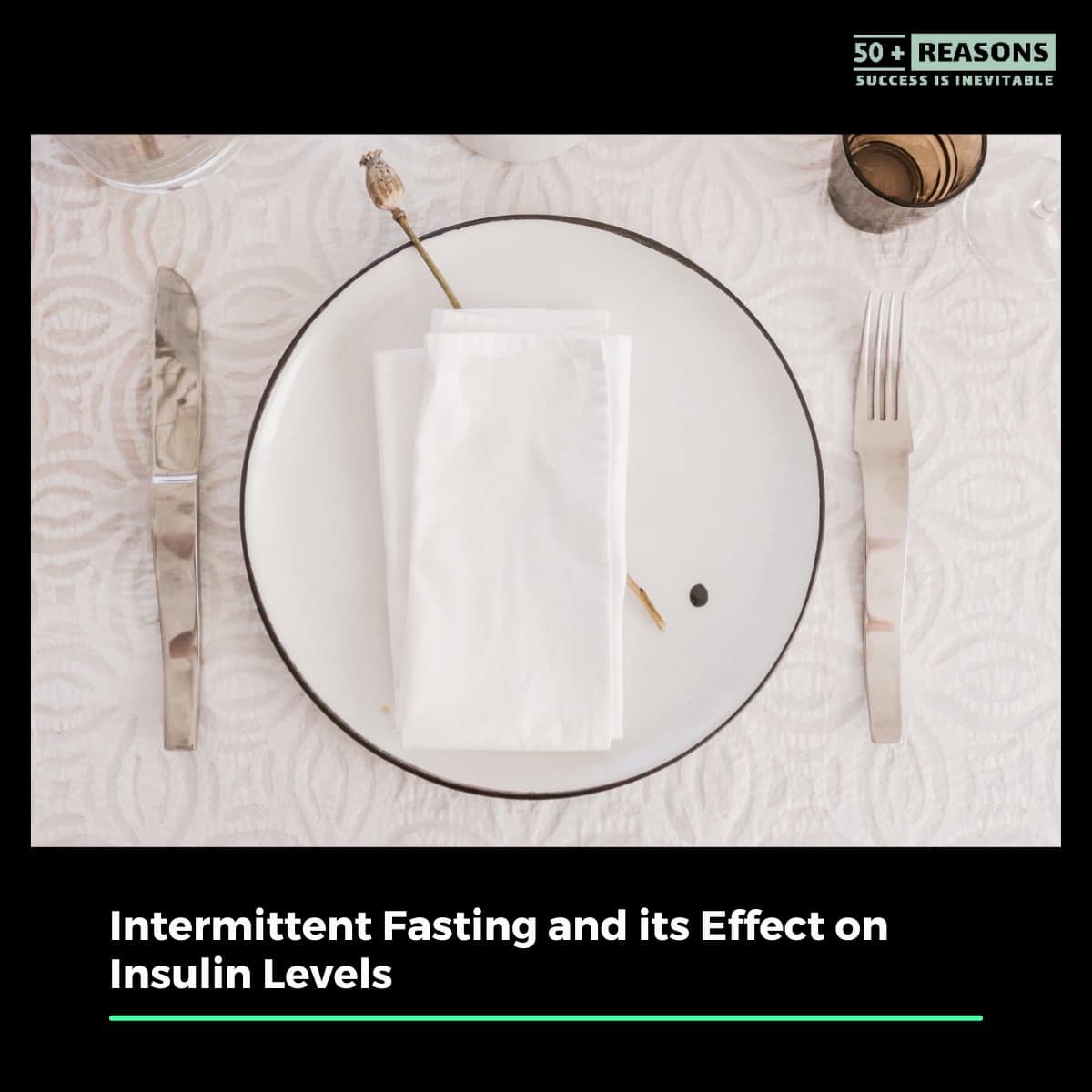Insulin Resistance, the Link Between High Blood Sugar, Depression and Diabetes
Are you looking to improve your mental health and overall well-being? The answer may lie in something you may not have considered before – your insulin levels. While most people associate insulin with blood sugar and diabetes, recent studies have shown that lowering insulin levels can have a significant impact on our mental health. In fact, it may be the key to becoming a mentally healthy person.
This article will explore the connection between insulin and mental health. You can lower your insulin levels through diet, sleep, exercise, and intermittent fasting to achieve optimal mental well-being.
Understanding Insulin and Blood Glucose Levels and Its Effect on the Brain
Insulin is an anabolic hormone often associated with blood sugar regulation and diabetes. However, recent research has revealed that insulin also plays a crucial role in our mental health and overall brain function. Understanding the effect of insulin on the brain is essential if we want to harness its power to improve our mental well-being.
The hormone insulin is a key that allows glucose to enter our cells, providing them with the energy they need to function correctly. In the brain, insulin plays a vital role in regulating neurotransmitters. These are the chemical messengers responsible for communication between brain cells. By controlling neurotransmitter levels, insulin helps to regulate mood, cognition, and overall brain function.
When insulin levels are imbalanced, it can lead to a disruption in neurotransmitter levels. This leads to symptoms of mental health disorders such as depression and anxiety. Studies have shown that individuals with insulin resistance (a condition where the body’s cells become less responsive to insulin) are more likely to experience symptoms of mental health disorders.
High insulin levels can also lead to chronic inflammation in the brain. Inflammation can damage brain cells and disrupt normal brain function, further contributing to mental health issues.
Depression and Diabetes Are Linked

For a mentally healthy person Depression and Diabetes are Linked
Understanding the link between insulin and the brain allows us to recognize the importance of maintaining balanced insulin levels for optimal mental health. Reducing insulin resistance through various lifestyle interventions can improve our brain function and overall well-being.
In the following sections, we will explore the research evidence on lowering insulin levels for improved mental health. And the steps you can take to reduce insulin levels naturally. We will also dive into the role of diet, sleep, exercise, and intermittent fasting in regulating insulin levels and promoting mental health. So, keep reading to discover how to become mentally healthy by harnessing insulin’s power.
Research Evidence on How Diabetes and Depression Are Linked
Over the past few years, research has uncovered the fascinating link between insulin levels and mental health. Multiple studies have shown that lowering insulin levels can significantly impact our overall well-being and mental health.
One study published in the journal Psychiatry Research found that individuals with insulin resistance, a condition where the body’s cells become less responsive to insulin, had a significantly higher prevalence of symptoms related to depression and anxiety. This shows that there is a direct connection between insulin resistance and mental health disorders.
Another study published in Molecular Psychiatry explored the effects of lowering insulin levels on brain function. The researchers found that reducing insulin levels improved memory and cognition in participants. This indicates that insulin plays a crucial role in regulating brain function and that maintaining blood sugar control and balanced insulin levels can enhance our mental abilities.
In addition to these findings, research has also shown that high insulin levels can contribute to chronic inflammation in the brain. Chronic inflammation has been linked to various mental health disorders, including depression and cognitive decline. When you control your blood sugar, you can reduce this inflammation and even reverse these conditions.
These research findings provide strong evidence for the impact of insulin on mental health. By actively working to lower insulin levels, we can improve our overall well-being and reduce the risk of mental health disorders.
Type 1 and Type 2 Diabetes

mentally healthy person
Most of us don’t even realize we have diabetes or prediabetes. A fasting blood sugar reading of less than 100 mg/dL (5.6 mmol/L ) is normal. 100 to 125 mg/dL (5.6 to 6.9 mmol/L ) is diagnosed as prediabetes. 126 mg/dL (7.0 mmol/L ) or higher on two separate tests is diagnosed as diabetes.
So, any reading of 100 mg/dL or higher means you are living with diabetes or soon will be. It is important to get blood glucose and insulin tests done every six months.
This article will not discuss type 1 diabetes management, as people with this disease need to take insulin. In all cases, it is wise to speak to a health professional if you get a blood sugar reading that indicates you are developing or have type 2 diabetes. You are more likely to have depression if you have high levels of insulin.
The beauty is that we have such incredible bodies that a few healthy lifestyle choices can reverse diabetes complications in most cases.
You could do worse things with your time than learn about diabetes and understand the impact of blood sugar fluctuations on your overall physical and emotional health.
Steps to Reduce Insulin and Type 2 Diabetes Levels Naturally
When it comes to reducing insulin levels naturally, there are several steps you can take to achieve optimal mental health. Incorporating these lifestyle interventions into your daily routine can profoundly impact your overall well-being.
Step 1: Diet

mentally healthy person and diet
A balanced and nutritious diet is vital in regulating insulin levels. Avoiding sugar and carbohydrates is the key to managing your diabetes. Processed foods are also a killer, as they can cause a spike in blood sugar and insulin levels.
Instead, focus on consuming whole foods such as fruits, vegetables, lean proteins, and healthy fats. These foods provide essential nutrients while keeping insulin levels in check.
Step 2: Exercise

Exercise and a mentally healthy person
Physical activity helps improve insulin sensitivity, boosts mood, and reduces stress. Aim for at least 30 minutes of moderate-intensity exercise, such as brisk walking or cycling, most days of the week.
Regular exercise can lower insulin levels, promote weight loss, and improve overall mental well-being, which is essential to help manage diabetes.
Step 3: Sleep

mentally healthy person and sleep
Quality sleep is vital for insulin regulation and mental health. Lack of sleep can lead to insulin resistance and increased hunger hormones, which can contribute to overeating and weight gain. Aim for 7-9 hours of sleep per night and establish a consistent sleep routine to optimize your insulin levels and promote better mental health. Mental health conditions occur when sleep is neglected.
Watching TV, playing computer games, or even reading late into the night can cause mental health conditions over time.
Step 4: Intermittent fasting

Intermittent fasting and a mentally healthy person
Intermittent fasting is an eating pattern that involves alternating between periods of fasting and eating. This approach has been shown to improve insulin sensitivity and promote weight loss. There are various ways to incorporate intermittent fasting into your routine, such as the 16/8 method or alternate-day fasting. Consult with a healthcare professional or educate yourself before starting any fasting regimen. Dr. Jason Fung is a great diabetes educator. He explains the science of how a healthy lifestyle will benefit you.
Implementing these steps into your lifestyle can naturally lower your insulin levels and improve your mental health. Just to remind you, consistency is key. Gradually incorporate these changes into your routine and monitor how they affect your well-being. It’s important to consult with a healthcare professional before making significant dietary or lifestyle changes. With dedication and commitment, you can become mentally healthy and lower the risk of developing type 2 diabetes.
It would also benefit you to learn ways to manage stress, which is also proven to lower extra insulin.
Role of Diet in Regulating Insulin and Promoting Mental Health

Role of Diet in Regulating Insulin and Promoting Mental Health
Diet plays a crucial role in regulating insulin levels and promoting mental health. The food we consume directly impacts our body’s insulin response, making it a powerful tool for maintaining balanced insulin levels and optimal mental well-being.
To prevent insulin spikes and promote mental health, focusing on a balanced and nutritious diet is crucial. People with diabetes (type 2) eat a lot of sugary and processed foods. These can cause a spike in blood sugar and insulin levels. Instead, prioritize whole foods such as fruits, vegetables, lean proteins, and healthy fats. Whole foods like this provide essential nutrients while keeping insulin levels in check and ensuring you reach your health goals.
Incorporating fiber-rich foods into our diet can also help regulate insulin levels. However, it would be best to eat as little carbohydrates as possible. After we eat, our body breaks down carbs into glucose (sugar). As we know, glucose gives our cells energy. The glucose moves into the bloodstream and our blood sugar level rises.
Fiber does, however, slow down the digestion and absorption of carbohydrates, preventing sudden spikes in blood sugar and insulin. People with type 2 diabetes could do very well following a Ketogenic Diet.
Additionally, staying hydrated is essential for optimal insulin function. Drinking adequate water helps maintain proper blood volume and supports efficient nutrient transport, including insulin. We rarely drink the amount of water we should. Add an extra cup or two of water to your day.
We can regulate our insulin levels and promote better mental health by paying attention to our diet and making conscious choices.
Sleep and The Mentally Healthy Person

Sleep is Critical for Your Mental Health
Sleep and exercise are two essential factors that significantly manage insulin levels and promote overall mental health.
Quality sleep is crucial for maintaining balanced insulin levels. When we don’t get enough sleep or have poor sleep quality, it can lead to insulin resistance and increased hunger hormones. This combination can contribute to overeating, weight gain, and imbalances in insulin and blood sugar levels.
People with diabetes are more likely to battle with getting enough sleep. Aim for 7-9 hours of sleep per night and establish a consistent sleep routine to optimize your sleep for better insulin management.
Create a sleep-friendly environment by keeping your bedroom cool, dark, and quiet. Limit your exposure to screens before bed, and try relaxation techniques such as prayer or reading to help you unwind and prepare for a restful night’s sleep.
Exercise and its Impact on Insulin Management

Exercise and its Impact on Insulin Management
Regular physical activity helps improve insulin sensitivity, boosts mood, and reduces stress. When we exercise, our muscles use glucose for energy, which helps lower blood sugar and insulin levels. Lack of regular exercise is very often related to diabetes.
Incorporate exercise into your routine for better insulin management. It doesn’t even matter what type of exercise. Just get moving. Aim for at least 30 minutes of moderate-intensity exercise most days of the week.
Find activities you enjoy, such as walking, jogging, swimming, or dancing. Remember, consistency is vital, so make exercise a habit rather than a one-time occurrence.
You can positively impact your insulin management by prioritizing quality sleep and regular exercise. These easy lifestyle interventions are an essential key to mental health treatment. So, make sleep and exercise a priority in your daily routine as you strive to become a mentally healthy person.
Exercise has also been proven to lower the risk of heart attacks and strokes.
The Science of Intermittent Fasting and its Effect on Insulin Levels

The Science of Intermittent Fasting and its Effect on Insulin Levels
Intermittent fasting (I.F) is an eating pattern that has recently gained significant popularity. It involves alternating between periods of fasting and eating, typically restricting your eating window to a certain number of hours per day. But what exactly is the science behind intermittent fasting and its effect on insulin levels and high sugar levels?
When we fast, our body enters a state of ketosis, which starts using stored fat as an energy source instead of glucose. This shift in energy metabolism has a direct impact on insulin levels. As we eat, our body releases insulin to help transport glucose from the bloodstream into cells. During fasting periods, insulin levels decrease as the body switches to burning fat for fuel. What an incredible way to help control blood sugar.
Recent research is more frequently indicating that I.F can improve insulin sensitivity and lower insulin levels. One study published in the journal Cell Metabolism found that I.F improved insulin sensitivity in individuals with obesity and prediabetes. And another study published in the journal Nutrition Reviews concluded that I.F could effectively manage insulin resistance and prevent type 2 diabetes.
Other Advantages of Intermittent Fasting: To Help You Become a Mentally Healthy Person
Additionally, intermittent fasting has been shown to affect our mental health positively. During the fasting period, our digestive system gets to take a break, allowing it to rest and repair. Thereby, fasting can reduce inflammation in the gut, which has been linked to depression or anxiety. I.F has also been found to promote the production of brain-derived neurotrophic factor (BDNF), a protein that supports the growth and survival of brain cells.
While I.F may not be suitable for everyone, especially those with certain medical conditions or eating disorders, it is worth considering as a potential tool for lowering insulin levels and improving mental health. As always, it is essential to consult with a healthcare professional before making any significant dietary changes.
The Long-Term Benefits of Lowering Insulin Levels for Your Mental Health

Becoming a mentally healthy person
Managing to lower insulin levels has immediate effects on our mental health and provides long-term benefits for our overall well-being. Continuously and actively working to maintain balanced insulin levels, we can expect significant improvements in our mental health over time.
Long-term benefits of lowering insulin levels are the prevention of chronic inflammation in the brain related to mental disorders. Chronic inflammation has been linked to various mental health disorders, including depression and cognitive decline. If we reduce insulin levels, we can reduce this inflammation and potentially lower the risk of developing these conditions. Increasingly, one of the symptoms of depression is high insulin levels.
Conclusion
Another long-term benefit is improved brain function. Lowering insulin levels also positively affects our physical health, which can contribute to better mental health. High insulin levels are often associated with obesity, diabetes, and other metabolic disorders. Reducing insulin levels can lower the risk of developing these conditions and improve our overall physical well-being. When our physical health is optimized, it has a positive impact on our mental health as well.
In summary, there are numerous long-term benefits of lowering insulin levels for our mental health. These are reducing the risk of chronic inflammation, improving brain function, and enhancing our overall physical health, which means we can achieve optimal mental well-being in the long run. Incorporating lifestyle interventions such as diet, exercise, sleep, and intermittent fasting into our daily routine can help us maintain balanced insulin levels and ensure better health outcomes. Harnessing the power of insulin means we become mentally healthy individuals and enjoy a better quality of life.
Learning New Skills
I have found that learning new skills and growing are powerful answers to a happier life. If one of these skills brings more money into my account each week, then even better! From Berkshire Hathaway to Blackrock, all money managers use options to bring in extra income from their stocks. You can, too.
Options must be one of the easiest ways to take control of your money. Click below for a FREE ‘Options for Beginners course.’
Start to learn how to manage your own money.
Free
Great for Beginners
What’s Included
Learn how Options work.
Start to take charge of your savings





